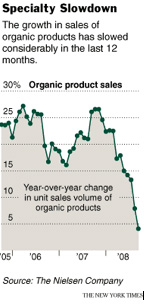
(With a click of her mouse, Kerry Trueman, aka EatingLiberally's kat, corners Dr. Marion Nestle, NYU professor of nutrition and author of Pet Food Politics, What to Eat and Food Politics:)
Kat: The Sacramento Bee reported on Sunday that a supposedly organic fertilizer used by nearly a third of California's organic farmers was in fact spiked with the synthetic fertilizer ammonium sulfate. In 2004, a whistleblower told California's Department of Food and Agriculture that this deception had been going on for five years.
The Department of Food and Agriculture tested the product and determined that the claim was true, but didn't order the company to take its product off the organic market until January 2007. "As a result," according to the SacBee, "some of California's 2006 harvest of organic fruits, nuts and vegetables - including crops from giants like Earthbound Farm - wasn't really organic."
The SacBee adds:
The product was finally yanked for the vague violation of "improper labeling." The state chose not to pursue harsher penalties against California Liquid Fertilizer for violating California's organic product law, and also declined to refer the case to the attorney general's office for civil action as an unfair business practice. An agriculture department spokesman told the SacBee that "our priority was to remove the product from the market...More process would have delayed that."
This sort of incident perpetuates the notion that higher priced organic foods are some kind of scam, and vindicates the many small-scale sustainable farmers who've chosen to go "beyond organic" and opt out of the organic certification process altogether. Doesn't California's Department of Food and Agriculture have a stake in maintaining the integrity of the organic standards?
Dr. Nestle: What a dismal story, and on so many levels. Cheating is the Achilles' heel of organics. The entire organic certification system is based on trust. If trust goes, the organic industry collapses like a house of cards. Organics means two quite different things. To people who care about the food system, organics is about growing crops and raising animals using methods that are good (for the health of people and animals), clean (for the environment), fair (to the people who produce the food), and sustainable (meaning renewing--not wasting or destroying--the earth's natural resources).
To everyone involved in raising and selling organic foods, organics is a business. This business commands higher prices if--and only if--buyers believe that the food is produced according to those criteria and is better for their health and that of the planet.
The rules that govern USDA's organic certification program attempt to address both food system and business concerns. As is usual for government agencies in the current political environment, business concerns take precedence. In setting the organic standards, the USDA tackled good and clean (although with some unfortunate compromises), but didn't bother at all with fair or sustainable.
The "beyond organic" folks want to eliminate the compromises and deal with the missing pieces. Fine, but what they do also depends on trust, especially because if they aren't certified, they are not inspected.
As I see it, trust in organic certification depends entirely on the integrity of the inspection system. The USDA certifies a motley group of agencies to visit farms and check to make sure that producers are following the rules. As I learned when researching the "organic" fish chapter of What to Eat, and even more from looking into the business of "organic" pet food, certifying agencies differ substantially in their application of the rules for organic production. Some take them seriously; some clearly don't.
When I was writing What to Eat, I went to a lot of trouble to evaluate the integrity of the organic system. I interviewed producers, government officials, and inspectors. In 2006, everyone involved with the system told me that the system worked pretty well and violations were more a matter of misunderstanding than of evil intent. But large industrial vegetable growers in California told me that they think the organic system is corrupt from top to bottom. They have a vested interest in thinking so, of course. So whom are we supposed to trust?
One of the problems with the depressing instance discussed in the Sacramento Bee is that you have no way of knowing whether it is rare or common. We need to know this. Much is at stake. If, as is clearly the case, the organic rules don't cover issues the public cares about, the inspection system is flawed, the USDA is constantly trying to weaken the standards, industrial producers are constantly trying to weaken the standards, and state departments of agriculture don't want to bother enforcing them, why should anyone be willing to pay more for organics?
That is why strong organic standards, diligently enforced, are better for everyone concerned and especially for business. Everyone should be lobbying the new administration for stronger and better organic standards. But maybe the whole thing is moot? In the current economic climate, organic sales are tanking (see chart). While waiting for all this to sort out, here's what to do: buy local from someone you know personally and think is worth trusting.
